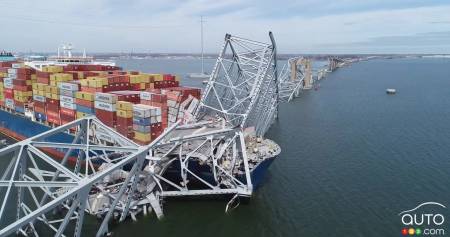The images of the tragedy that unfolded in Baltimore shocked many this past Tuesday morning. A ship collided with the Francis Scott Key Bridge, causing it to partially collapse.
Sadly, six workers on the bridge at the time died. Fortunately, the bridge was closed to traffic moments before impact, saving lives.
Beyond the human tragedy and the massive material damage resulting from this accident, an issue quickly surfaced in the automotive industry. The Port of Baltimore being a major hub for the automotive industry, could the supply of vehicles across North America be disrupted?
Many automakers now face the possibility of transportation problems on the U.S. East Coast. On Tuesday, following the collapse, the Port of Baltimore declared the suspension of shipping in and out of the port until further notice, although trucks could still be handled at the port's terminals.
The closure of the port creates a logistical headache for many manufacturers who import vehicles into North America from this location. The port is used for vehicles but also for components.
According to Automotive News, Volkswagen and BMW will be less affected because their terminals are located to the east of the bridge and remain accessible. Others are not so lucky, and will have to find alternative solutions until things return to normal.
“This is a terrible tragedy and our sympathies go out to those injured and still missing in Baltimore,” said John Bozzella, CEO of the Alliance for Automotive Innovation, which represents Ford, GM, Toyota, Volkswagen and other automakers in the U.S. “It's too early to say what impact this incident will have on the auto business, but there will certainly be a disruption. Baltimore is the No. 1 automobile port in the U.S.”
To give you an idea, a total of 847,158 vehicles passed through the Port of Baltimore's private and public terminals last year. That's more than any other port in the United States.
The main stakeholders will have to find alternative solutions and bypasses, but short-term supply will certainly be disrupted.
Mercedes-Benz is studying the situation closely. The Port of Baltimore is one of four U.S. distribution centres used by the German automaker to receive its vehicles from Europe.
A General Motors spokesman told the Detroit Free Press that the company is working with its logistics suppliers to find shipping options to other ports. However, GM does not expect major disruptions to its shipping operations.
Other automakers affected by the suspension of traffic at the Port of Baltimore are expecting minimal consequences. However, the extent of the disruption, as well as its duration, will probably not be known for some time.
Let's hope for all concerned that the disruption is not too severe. The supply chain has suffered greatly since the pandemic.




